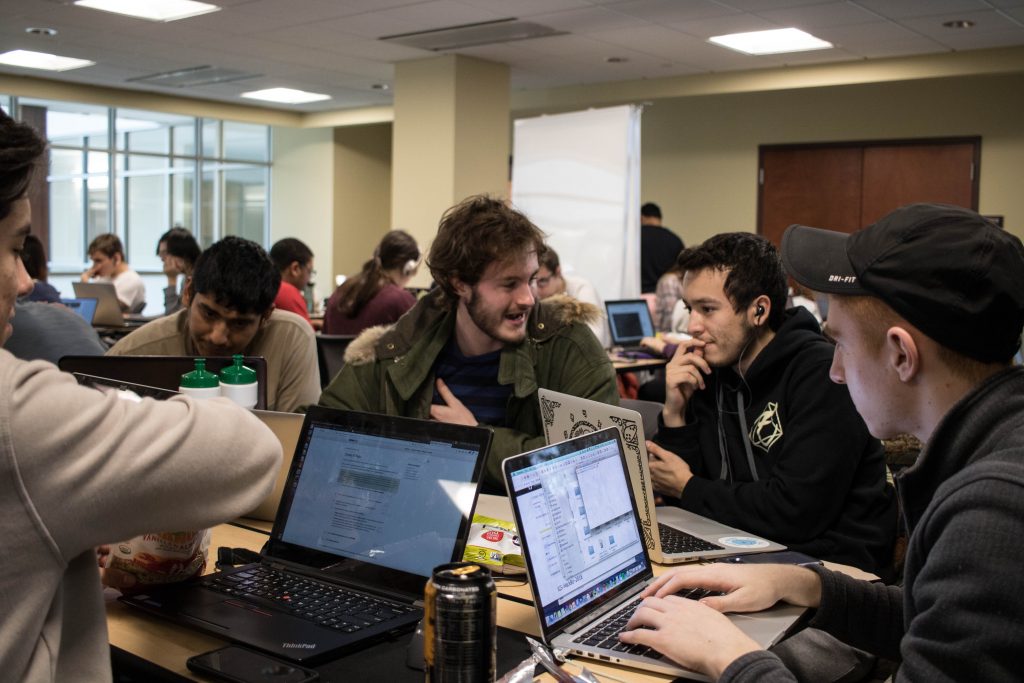
This weekend, over 250 students worked to make their coding and programming ideas a reality.
At HackBU’s fifth annual 24-hour hackathon, hackers, coders, programmers and web developers came together to build computer programs and tackle challenging problems. The hackathon, which took place at Binghamton University’s Innovative Technologies Complex, began at 1 p.m. on Saturday and ran until 1 p.m. on Sunday. Sponsored by companies like Global Trading Systems, Citibank, Vanguard and Bloomberg, HackBU’s hackathon provides opportunities to win prizes and meet employers for students who are interested in programming, coding, web development and other aspects of working with computers.
Anybody with an interest in hacking was welcome to participate, and students could register as a team of up to four people, or come solo and be assigned to a team on Saturday afternoon during scheduled team-building time. According to Thomas Avery, a volunteer for HackBU and a junior majoring in computer science, whether a participant comes with a set team and plan or decides to build a team at the event, the ultimate goal remains the same — to build something new.
“At its core, I guess it’s a competition,” Avery said. “But the times that I’ve come, I’m here to have fun and to see what I can learn. If you think you’ve made something cool, then you can submit it at the end.”
The hackathon began with an opening ceremony to thank sponsors for their support before students began the hacking process for their projects. Meals were provided by local restaurant sponsors, including Panera Bread, Tully’s Good Times and Insomnia Cookies. Throughout the weekend there were several scheduled talks from company representatives hoping to recruit students.
The competition concluded on Sunday afternoon, as teams presented to the judges — primarily BU computer science instructors and information technology staff members — in a science fair-style exposition. Of the students who attended or participated at the hackathon, 97 were part of the 33 final teams that submitted projects at the end of the weekend.
Projects included a dating app for introverts, a website that helps users choose online clothing sites best suited for them and a computer game that aimed to shed light on sexism within technology workplaces. One team, which included BU students Benjamin Weiss and Matthew Wilomovsky, both sophomores majoring in computer science, and Joshua Eimer, a sophomore double-majoring in computer science and mathematics, made a program that informs users about their email security, titled “Secure Web Project”.
“This is the ultimate test,” Wilomovsky said. “You set yourself a goal to do something, something potentially super-crazy, and see if, in 24 hours, can you feasibly brainstorm the idea, get started on it, and then have some form of it rolled out by the next day.”
Winners were announced at the closing ceremonies, and prizes for each category were announced.
The best overall hack award, sponsored by Global Trading Systems, and best newbie hack award went to “HackBU2018-Fake-News-Detector.” The program, created by BU students Colin Fiutak, a sophomore double-majoring in computer science and history; Kerry O’Neill, a freshman majoring in computer science; Hayden Brown, a junior double-majoring in computer science and mathematics; and Gabriel Steinberg, a sophomore majoring in computer science, can automatically detect and label fake news by searching an article’s contents and running several text analysis algorithms to determine certain features. These features are then fed into a network that labels the articles as “real news” or “fake news” and reports the confidence of the program’s findings. The project also won in the best security hack category.
“With every important upcoming election there is a huge influx of fake news that people often fall for and he wanted to figure out a way to trust a machine to tell you whether you should trust an article or not,” Steinberg wrote. “This weekend was rough. At around 6 a.m. I was incredibly close to calling it quits until the morning but Colin stayed up with me and pushed me to finish the code I was working on.”
According to David Axelrod, one of the main organizers of the event and a senior majoring in business administration, there are hackathon events happening all over the country throughout the year.
“I highly recommend to students involved in HackBU to not only come here, but to try out other hackathons as well,” Axelrod said. “For me, here, it’s close to home and close to the heart.”
Some first-time participants like Isaac Wecht, a sophomore double-majoring in economics and philosophy, politics and law, came to the hackathon without prior knowledge of coding or programming with the intent of learning from their fellow hackers throughout the event.
“Coming into HackBU, I was a rookie with no experience,” Wecht said. “However, after observing the culture and energy around this event, I am more excited and intrigued to begin learning how to code.”
Correction: Feb. 14, 2017
The “HackBU2018-Fake-News-Detector” team won awards for best overall hack and best newbie hack, not the most interesting hack award.
The “Secure Web Project” team did not win an award.


